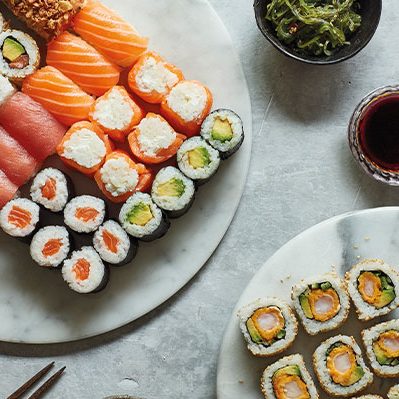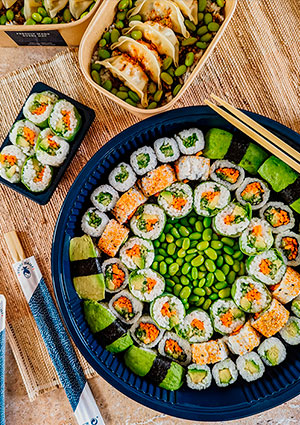
Sushi Daily brings sushi to the masses – how does it balance quality and convenience?
Making sushi is a precise art. There’s a reason why some sushi rolls, painstakingly created by masters of their craft, command price tags in the hundreds – or, in rare cases, thousands – of dollars range.
The inventor of what we now understand as sushi is widely considered to be Hanaya Yohei, who created nigiri-zushi, a kind of sushi many would recognize today: seafood, or a vegetarian equivalent, carefully served on top of hand-pressed and vinegared rice.
Over the years, the West has come to embrace the beauty and precision of Eastern cuisine. In Japan, sushi is a mainstay; however, in the US, UK, and across Europe, it still offers foodies that sense of exploration and wonder.
And access to the precise art has never been easier. In the US, the first sushi store is thought to have opened in 1906 in the Little Tokyo neighborhood of Los Angeles. Whereas, in the UK, Prince Akihito, 125th Emperor of Japan, is rumored to have brought the unique food over in 1953 while visiting Queen Elizabeth II at her coronation.
Since then, sushi has skyrocketed in popularity. Westerners can now easily experience a taste of Asia in restaurants and from on-the-go kiosks wherever they might be.
 One of the leading companies behind that movement is KellyDeli, whose flagship brand, Sushi Daily, operates according to the mantra Happily Handmade, and has undertaken the mission to serve top-notch sushi to the masses.
One of the leading companies behind that movement is KellyDeli, whose flagship brand, Sushi Daily, operates according to the mantra Happily Handmade, and has undertaken the mission to serve top-notch sushi to the masses.
Fine-art freshness
Recently, Food Chain sat down with Daniel Coole, KellyDeli’s Chief Commercial Officer, to talk all things sushi. Before joining the business some eight years ago, Daniel first trained as a chef and then spent 20 years working in supermarket retail, casual dining, and quick service.
“We are on a mission to bring the best of Asia to the world through our Asian-inspired brands, which include Sushi Daily kiosks and our Kelly Loves grocery range among others,” he begins, speaking of the wider founder-owned business. “Sushi Daily is our most prominent brand and is available in partnership with retailers throughout Europe, plus some new territories such as the UAE and Mexico.”
The company was founded by Korean Kelly Choi. After spending seven years in Tokyo as a twenty-something with a passion for Japanese culture and food, the young entrepreneur recognized that taste trends were no longer split by an East-West binary; globalization had blurred the lines, and Western pallets were, she believed, ready for a new everyday food: sushi.
Working with Master of Sushi, Yamamoto-san, Kelly launched Sushi Daily, having convinced him that, indeed, sushi could be both exquisite and convenient. In Daniel’s words: “Kelly’s founding vision was to combine the best ingredients with the finest craftmanship to make high-quality sushi available to both consumers and entrepreneurs, which she achieved through our sushi kiosk franchise model. As such, we’ve created a multi-million-pound industry and opened the door for lots of businesses, while also proffering a stepping stone for Asian people in European markets.”
Sushi Daily’s so-called Sushi Artisans make fresh, high-grade sushi at the brand’s kiosks inside retail stores and supermarkets every day. In the UK, kiosks are available in 140 Waitrose stores, selected Asda superstores, Click & Collect on sushidaily.com, and via Deliveroo.
It’s all about making the precise art accessible to all without compromising on taste. Consistency is key – and fresh always comes first.
Daniel talks us through his thoughts: “Asda and Waitrose are our core retail partners in the UK; we run independent Sushi Daily kiosks inside the stores with our franchisees,” he details. “Simply put, we want to make fresh, restaurant-standard sushi available to people doing their weekly shop. All our products are, therefore, made fresh in-store each day. As an independent business, we manage our supply chain and delivery into these stores.”
For Daniel, when it comes to quality, consistent results are achieved precisely because of careful supply chain management, ethical sourcing of sustainable products, and KellyDeli’s emphasis on training. He elaborates further: “To create a high-end product every time, our Sushi Artisans are put through a rigorous four-to-six-week teaching program at one of our central training centers.
 “During this course, they’ll learn how to make a great product and meet our quality criteria before they start work at their own kiosks. We also have strong audit and quality control systems in place, which is a fundamental pillar of our strategy.”
“During this course, they’ll learn how to make a great product and meet our quality criteria before they start work at their own kiosks. We also have strong audit and quality control systems in place, which is a fundamental pillar of our strategy.”
Change for good
As of 2022, KellyDeli reached a total 1619 points of sale, including its 1000th Sushi Daily kiosk, while annual sales delivered in excess of half a billion euros. Despite that impressive growth, the company has not lost sight of its focus on embedding sustainability within its supply chain.
Indeed, as Daniel has already pointed out, maintaining the integrity of KellyDeli’s processes while increasing its sustainability credentials is integral to ensuring the quality of its product. “We’re really focusing on our Corporate Social Responsibility (CSR) agenda and have a ‘Change for Good’ program, which supports nine of the 17 United Nations Sustainable Development Goals to improve the planet and the lives of its people by 2030,” Daniel reveals.
“All of our fish and seafood is responsibly sourced, and we hold MSC and ASC accreditation,” he details. “We are also a member of the Round Table on Responsible Soy, work to the European Chicken Commitment, source free range eggs, and our rice is certified under the Sustainable Rice Platform (GLOBALG.A.P.). In short, we’re committed to doing things the right way, and that means ensuring we source the finest Asian ingredients and European alternatives.”
According to Daniel, KellyDeli was also the first company to utilize recyclable sushi trays made from 100 percent recycled PET, eliminating approximately 48 tons of plastic waste every year, and has worked with Action Against Hunger to raise $450,000 to help end food insecurity. Over the next three years, the food giant aims to raise more than one million euros for the charity.
In that time frame, the company also intends to grow its other brands including Happy Tokyo, which is a sushi and hot food concept with a pan-Asian twist, and Kelly Loves grocery range. “The future is all about delivering our mission to bring the best of Asia to the rest of the world,” concludes Daniel. “We’ve also got an aspiration to grow our digital footprint via Click & Collect and we will continue to work with delivery aggregators such as Deliveroo across myriad markets.
“Looking at the bigger picture: KellyDeli is a great business; we’ve been first-to-market in almost every market that we’ve opened and have operated where competitors have been and gone. We’ve found a model that works for us and our partners, and we are now focusing on the long-term journey.”